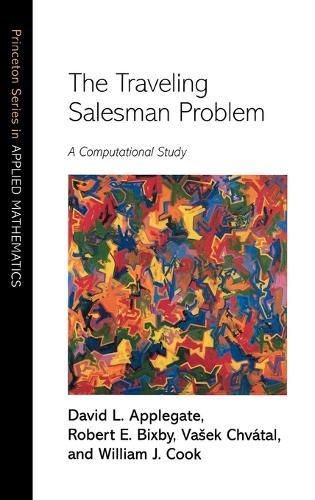Awards
- Winner of INFORMS Frederick W. Lanchester Prize 2007
- Winner of INFORMS Frederick W. Lanchester Prize 2007.
- Winner of Lanchester Prize, Informs 2007
Overview
This book presents the latest findings on one of the most intensely investigated subjects in computational mathematics--the traveling salesman problem. It sounds simple enough: given a set of cities and the cost of travel between each pair of them, the problem challenges you to find the cheapest route by which to visit all the cities and return home to where you began. Though seemingly modest, this exercise has inspired studies by mathematicians, chemists, and physicists. Teachers use it in the classroom. It has practical applications in genetics, telecommunications, and neuroscience. The authors of this book are the same pioneers who for nearly two decades have led the investigation into the traveling salesman problem. They have derived solutions to almost eighty-six thousand cities, yet a general solution to the problem has yet to be discovered. Here they describe the method and computer code they used to solve a broad range of large-scale problems, and along the way they demonstrate the interplay of applied mathematics with increasingly powerful computing platforms. They also give the fascinating history of the problem--how it developed, and why it continues to intrigue us.
Full Product Details
Author: David L. Applegate ,
Robert E. Bixby ,
Vašek Chvátal ,
William J. Cook
Publisher: Princeton University Press
Imprint: Princeton University Press
Volume: 17
Dimensions:
Width: 15.20cm
, Height: 3.80cm
, Length: 23.50cm
Weight: 1.049kg
ISBN: 9780691129938
ISBN 10: 0691129932
Pages: 608
Publication Date: 04 February 2007
Audience:
Professional and scholarly
,
College/higher education
,
Professional & Vocational
,
Tertiary & Higher Education
Format: Hardback
Publisher's Status: Active
Availability: Manufactured on demand

We will order this item for you from a manufactured on demand supplier.
Language: English
Reviews
The authors have done a wonderful job of explaining how they developed new techniques in response to the challenges posed by ever larger instances of the Traveling Salesman Problem. MAA Online By bringing together the best work from a wide array of researchers, advancing the field where needed, describing their findings in a book, and implementing everything in an extremely well-written computer program, the authors show how research in computational combinatorial optimization should be done. -- Michael Trick Operations Research Letters The book is certainly a must for every researcher in practical TSP-computation. -- Ulrich Faigle Mathematical Reviews It is very well written and clearly structured. Many examples are provided, which help the reader to better understand the presented results. The authors succeed in describing the TSP problem, beginning with its history, and the first approaches, and ending with the state of the art. -- Stefan Nickel Zentralblatt MATH
The authors have done a wonderful job of explaining how they developed new techniques in response to the challenges posed by ever larger instances of the Traveling Salesman Problem. -- MAA Online By bringing together the best work from a wide array of researchers, advancing the field where needed, describing their findings in a book, and implementing everything in an extremely well-written computer program, the authors show how research in computational combinatorial optimization should be done. -- Michael Trick, Operations Research Letters The book is certainly a must for every researcher in practical TSP-computation. -- Ulrich Faigle, Mathematical Reviews It is very well written and clearly structured. Many examples are provided, which help the reader to better understand the presented results. The authors succeed in describing the TSP problem, beginning with its history, and the first approaches, and ending with the state of the art. -- Stefan Nickel, Zentralblatt MATH [T]the text read[s] more like a best-seller than a tome of mathematics... The resulting book provides not only a map for understanding TSP computation, but should be the starting point for anyone interested in launching a computational assault on any combinatorial optimization problem. -- Jan Karel Lenstra, SIAM Review
Author Information
David L. Applegate is a researcher at AT&T Labs. Robert E. Bixby is Research Professor of Management and Noah Harding Professor of Computational and Applied Mathematics at Rice University. Vasek Chvtal is Canada Research Chair in Combinatorial Optimization at Concordia University. William J. Cook is Chandler Family Chair in Industrial and Systems Engineering at the Georgia Institute of Technology.




